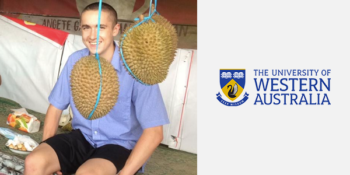Matthew Rapkoch is a student from the The University of Western Australia. Matthew undertook the Indonesian Language Short Course at Satya Wacana University in Salatiga with the assistance of a $3,000 New Colombo Plan Mobility Grant in 2020.
Q: Why did you decide to undertake ACICIS’ Indonesian Language Short Course?
I decided to undertake the ILSC program as I wanted to broaden my study experience at university, which had previously been dedicated almost entirely to my undergraduate major fields. The ILSC program allowed me to utilise my broadening units set aside in my degree in a very different way to the usual options, which usually consist of simply taking two forgettable or easy units as a relief from the usual coursework. So on top of fulfilling course requirements at university, I was provided with a great opportunity for an immersive cultural experience provided whilst learning a geographically relevant language.
Q: Did you receive a New Colombo Plan Mobility Grant? If so, how did this contribute to your experience in Indonesia?
The Colombo grant really helped my time in Indonesia by obviously providing a significant financial boost that allowed me to pay for the basics of the course upfront, such as tuition and airfare. This thus allowed me to dedicate more of my own money to cultural experiences and immersing myself in Salatiga without worrying of exceeding my budget or stretching my finances.
Q: What did you find to be the most challenging about the ILSC?
The most challenging aspect of the program I found was simply navigating my way through and interacting with people in Salatiga due to having no proficiency in Bahasa Indonesia prior to arrival, being a level 1 student.
Q: How will your proficiency in Indonesian Language gained through the Indonesian Language Short Course influence your future career or study?
The language skills learned during the program will act as a solid base from which to build greater proficiency in Bahasa Indonesian, covering the basics of grammar and sentence structure in a way hard to replicate outside of Indonesia. It also opens up career possibilities for students by adding another language to their repertoire, something employers always see as favourable.
Q: How different is in-country Indonesian language learning to your previous experience learning Indonesian in Australia?
Classes at UKSW were a lot longer in duration to those in Australia, being 100 minutes long, however I found they rarely felt overwhelming or tiresome, due to having a slower pace compared to your average tutorial in Australia. The teachers also spaced out sessions with some fun or easier activities for relief, and there were plenty of revision based tasks to ensure the topics covered were ingrained.
Q: Would you like to return to Indonesia for future study or work?
Yes.
Q: What did you enjoy most about the course?
The time spent with my homestay family, who welcomed me and endeavoured to ensure I was exposed to as many Indonesian cultural experiences as possible.
Q: What did you like to do in your spare time in Salatiga?
Exploring the city and the various little cafes and shops was a favoured pass time.
Q: What is your favourite Indonesian food?
Kangkung dan Nasi Goreng
Q: What is your favourite Indonesian phrase?
Jam karet


